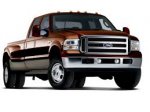Everything else* is merely the observations of a systems engineer regarding FreeNAS's rough corners. Yes, these observations are my opinions, but they aren't random opinions. They are opinions derived from a model of the FreeNAS system as a whole, broad-strokes understanding of the underlying subsystems, and critical thinking on the usability of the system and interfaces between subsystems. Of all the rough edges, any mention of potential pool corruption stands out, as this is the one thing FreeNAS should never do: corrupt your pool. I'm sorry that you seem take these observations as a personal affront, they certainly aren't intended to be.
I'm a professional UNIX systems engineer by trade, and I've been working with FreeBSD since before 386BSD 0.1.
Your opinion is noted but not deemed meaningful. There /is/ such a thing as understanding appropriateness to a task.
Let me explain in pictures.

can pull

.

can pull

.

can pull

.
Now, in theory you can hitch

up to

and try to give it a pull, and you might even be able to move it, but ultimately the stresses caused are going to ruin the car engine and you are going to suffer a catastrophic failure.
There is not a hard boundary, and you can slowly ramp up the trailer sizes and probably still be successful up to a point where the car struggles to climb a steep hill, or just a hill, etc. But the increases in trailer size correspond to an increased risk of catastrophic damage to the engine and vehicle.
That said, as you mention yourself, no configurations running 8 GiB of RAM exhibited the pool corruption issue.
I did not say that. I said that no REASONABLE 8GB configuration was exhibiting crashes, etc. We've always considered a reasonable configuration to be one that lives within the general realm of configuration guidelines.
Why then suggest that a configuration running 8 GiB of RAM with a 128 TiB pool could corrupt your data? In these reports from several years ago, was the corruption ever correlated with pool size, or was it just on systems with less than 8 GiB of RAM regardless of pool size?
It's because I recognize that the likely culprit that causes panicks would be kernel resource starvation or exhaustion, and that ZFS makes some vague assumptions about sizing of this-and-that as a function of memory size, and requires certain quantities of resources in order to operate effectively.
Put, more simply, I just automatically know that

cannot pull

in any meaningful way, and am not really interested in continuing this thread. I promise virtually nothing at all if you try to make such a pairing between a tiny server and a huge pool. I don't promise it'll crash. I don't promise it'll corrupt. But, more importantly, I don't promise it'll work, and I know that I wouldn't trust my data to such a pairing.
I can tell you that I've put a 30TB pool on a 6GB system and pounded the crap out of it trying to make bad things happen, but aside from being about 1/3rd the speed of the same system with 32GB RAM, it seemed fine. I'm not really terribly interested in running configurations in production that might be problematic, so basically I'm capable of looking at the underlying issues and saying "I see why ZFS needs memory, the general guidelines are X, I am fairly confident based on experience and observation that I can bend this at least to Y, but that Z represents an unacceptable risk."
I have no problem if you want to take and do a deep analysis on the technical issues underlying this, and you're again encouraged to do so. Many years ago I had such energy and drive. These days I mostly just want our operations to work well and for stuff not to crap all over the place. I don't feel a compelling need to fully understand the exact knife blade point at which ZFS might fail as long as I can design a system that never strays anywhere near that cutoff point. I know how to be certain I'm nowhere near that point.
I'm sure the automotive people have complicated graphs of just how much weight a VW Bug can pull up various inclines, and how failure rates increase as those numbers are manipulated. That's great. I don't need that sort of insight. I just buy a heavier car if I want to pull a bigger load, because I just *know* a VW Bug can only safely pull a light load without significant risk.
Again, I have nothing against it (and indeed welcome it) if you want to dive deeply into things to find a more precise answer to the questions you have. But it is work you'll need to do yourself.






